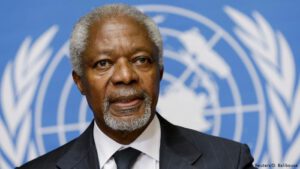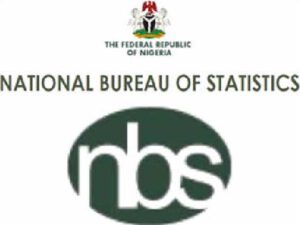By Godwin Osademe
Kofi Annan, Seventh Secretary-General of the United Nations once said that “ extreme poverty anywhere is a threat to human security everywhere.“ This statement is apt when one considers how extreme poverty in Nigeria has contributed largely to illegal migration in Nigeria and its impact on a global scale.
This year alone, the number of ladies begging for evacuation from some middle East countries, in a viral video, is alarming.

Nigeria’s developmental retardation is premised on poor leadership, economic stagnation, intractable insecurity challenges and lack of supportive infrastructure which breeds poverty, unemployment and hardship in the country.
As an escape route, illegal migrants engage in cross-border drug peddling, smuggling of contraband goods, organ harvest, human trafficking, forced labour, prostitution and menial jobs. Some also take up refugee and asylum claims for frivolous reasons. This leads to concomitant harsh treatment of Nigerians abroad. Frankly, this trend has to be addressed if Nigeria must be respected in the comity of nations, given its status as a regional influential and the giant of Africa.
According to Lanre Ikuteyibo of the Obafemi Awolowo University, Ile Ife, Nigeria, in a Study conducted on Why Nigerians Risk Illegal Migration to Find their “Eldorado”, “irregular migration tends to fester in the face of economic adversity ( poverty).”
He further stated that “Young Nigerians make up the largest population of the growing flow of migrants from Africa to developed countries. In 2016, over 20,000 involved in the Mediterranean Sea crossing were reported to be from Nigeria”. The link between illegal Immigration and poverty is striking and both need to be addressed in this piece.
Going by the reports of the World Poverty Clock, more Nigerians have been plunged into extreme poverty since November 2019. According to The Guardian reports of November 05, 2020, the latest figure shows that over 105 million Nigerians, out of 205,323,520 projected population of Nigeria, representing 51 percent now live in extreme poverty. An individual is classified as living in extreme poverty if the person earns below $1.90 or N855 a day, according to the paper.
However, the National Bureau of Statistics (NBS) in May 2020 released its 2019 report on “Poverty and Inequality in Nigeria” and put the figure of Nigerians living in extreme poverty at 89.2 million. This represents 40.1 percent of Nigeria’s population, reports The Guardian newspaper.

Whether poverty rate in Nigeria is 51 percent or 40.1 percent, the fact remains that it is high and rising every year. There are no signs that it is not going to soar in the coming years.
Nigeria’s inflation rate jumped to 14.23 per cent, year-on-year, in October 2020 from 13.71 percent in September 2020 as a result of escalating food prices and a protracted crisis in the foreign exchange market, according to The Guardian newspaper reports of November 17, 2020.
To buttress this fact, the Director-General of Nigeria Employers’ Consultative Association (NECA), Dr. Timothy Olawale, said that the persistent increase in food prices, caused by border closures, restrictions in the foreign exchange market and insecurity are factors that have led to rising inflation. The deregulation of the downstream oil sector has witnessed the increase in petrol pump price by almost 30 per cent in the last four months, which suggests a continuous increase in transport cost. Sadly, the masses are now being battered on two fronts, high transport cost, and high inflation.
Considering the high rate of poverty and unemployment , the continuous increases in the prices of consumable goods, rent, school fees, electricity bills and the challenges thrown up by them, the average youth in Nigeria thinks that the immediate solution to the these challenges is to seek greener pastures overseers. Sadly, they engage in this at all cost.
In order to address this social challenge, we need to address the following questions: Why do Nigerians embark on illegal migration? What are the impacts of illegal migration on Nigeria? What solutions are we going to proffer to this social challenge? Firstly, Let us look at the meaning of migration.
According to Umar Kari, at al, quoting Salaheddine (2010),” International migration can be defined as the permanent movement of individuals or groups from one place to another. It a basic fact of human history”. Illegal migration can thus be defined as an unauthorized movement of individuals or groups from one place to another.
Why do Nigerians embark on illegal migration? Umar Kari at al identify the push factors which refer to the circumstances at home that push individuals to seek greener pastures abroad such as poverty, famine, unemployment, insecurity, among others. The pull factors are those conditions found abroad which attract foreigners to those countries.
They include employment opportunities, favourable economy, stable economic policies for business, good and supportive infrastructure, responsible leadership, among others. According to Lanre Ikuteyibo, three factors: economic reasons, family dynamics and social media facilitate illegal migration.
The impacts of illegal migration are negative and positive from empirical studies. On the negative side, It leads to high mortality rate as organs of some illegal migrants are harvested for economic advantage. Unhealthy travel conditions and means of transportation abroad have led to boat wrecks and untimely deaths of many migrants in the Sahara desert.
Illegal migration poses a huge demographic pressure on European countries and other host nations as a result of ageing European societies. It leads to higher unemployment in the host countries and festers international dispute among countries. No doubt, it causes serious image crisis as the Nigerian International passports is a suspect for citizens who have to cope with the embarrassment and antagonism of Immigration officers.
Illegal migration of Nigerians into Canada took the media space few years ago. On May 3 2018, the Voice of America (VOA) reported that Canadian government was trying to stem the flow of asylum seekers illegally walking across the U.S. border into Canada who eventually file refugee claims: “The Canadian government says many of the more recent arrivals are Nigerians who arrived bearing valid U.S. visas after having spent very little time in the United States..”.
This concern is not yet abated. It is a concern for the Canadian government. Inspite of these negative impacts, illegal migrants contribute to the economic wellbeing of their families back home. They also take up jobs that legal residents refuse such as domestic staff, mortuary attendants, security watch, and some professional jobs.
The following solutions may be helpful in addressing illegal migration: Government needs to design economic policies that will ensure economic and social wellbeing of Nigerian citizens to encourage nationals to stay at home and contribute to nation building. Nigerian citizens must make demands of responsible leadership on government and display uncanny courage to resist corrupt leadership.
Government must demystify fantasies surrounding the idea that life abroad holds a lot of promises, when this is not always so. A friendly Immigration policy should be facilitated by source and host countries to encourage legal migration.
This will foster friendliness and symbiotic relationships between source and host countries. Immigration laws and strict enforcement should be strengthened to track illegal migrants and those found culpable should be made to face the full wrath of law. The educational sector should be strengthened to ensure that graduates of our institutions are well equipped to take up entrepreneurship.
Finally, refugee and asylum challenges should be tackled with crisis communications strategies such as inclusive communication which promotes diversity and social cohesion, persuasive communication and reactive Communication.
In conclusion, government needs to address the rising rate of poverty in the country and make it a matter of priority so that the economic and social well being of Nigerians is addressed. A deliberate, planned and implementable systematic crisis communications strategy should be put in place to address embarrassing forced labour, prostitution, asylum and refugee crisis caused by Nigerians.
Therefore, existing migration laws should be strengthened or new ones put in place to track illegal migration in the country. When these measures are put in place, the challenges of illegal migration in Nigeria will be substantially addressed.
*Godwin Osademe, a public relations and communications practitioner wrote from Lagos